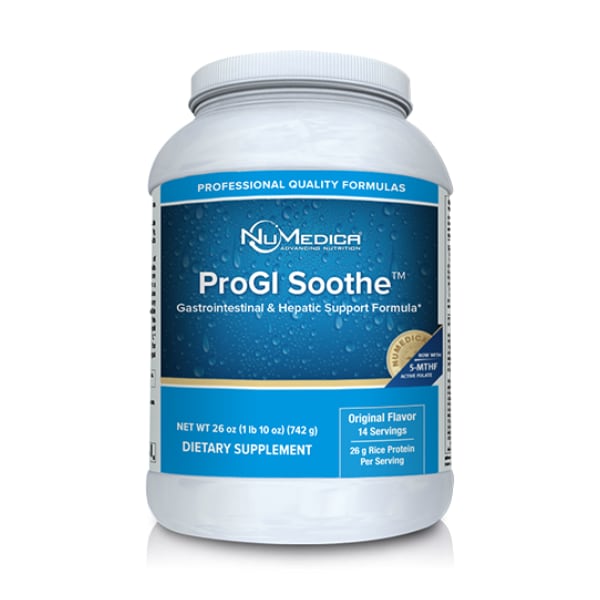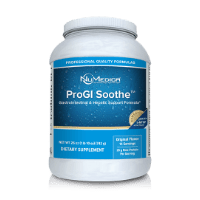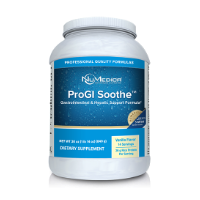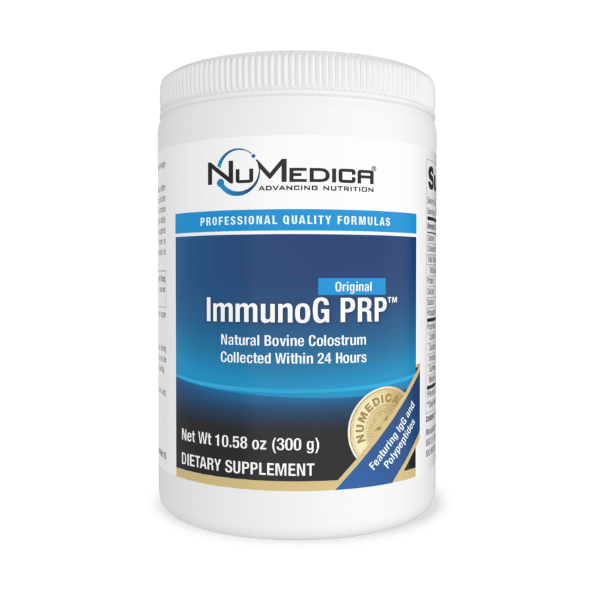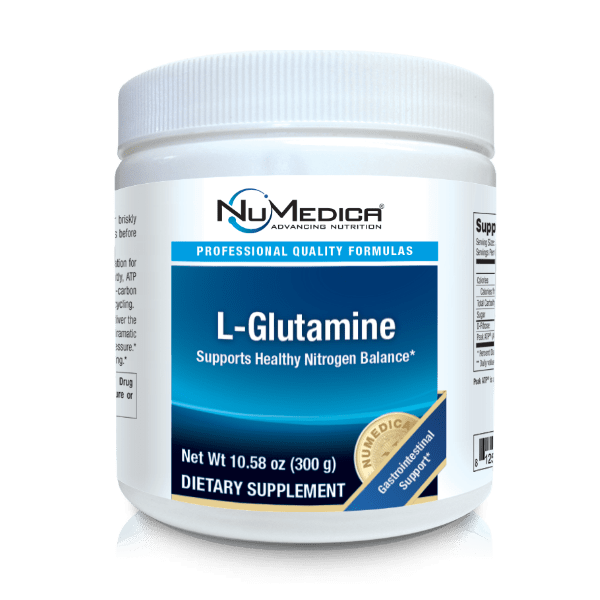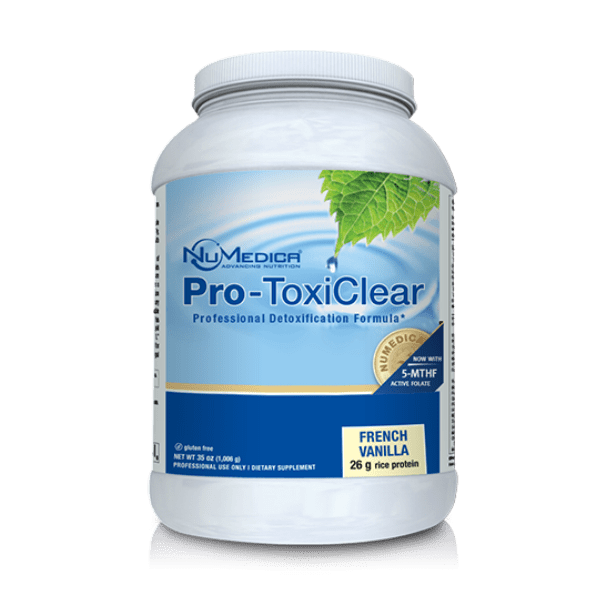ProGI Soothe
by NuMedica
Original - Vanilla | 14 ServingsNuMedica ProGI Soothe
Gastrointestinal & Hepatic Support*
Designed with amino acids and hypoallergenic rice protein that support gastrointestinal health and enhance liver function and detox.*
![]() On backorder at NuMedica and will ship as soon as back in stock to get it to you as quickly as possible.
On backorder at NuMedica and will ship as soon as back in stock to get it to you as quickly as possible.
Vanilla flavor is in stock - only Original flavor is on backorder expected by 5/15/24.
-
Description*
NuMedica ProGI Soothe Gastrointestinal and Liver Support
NuMedica ProGI Soothe is an easy-to-digest protein made with hypoallergenic rice that supports digestive system health and may even enhance the skin and joints. This powerful natural supplement can also support detoxification by enhancing liver function. NuMedica ProGI Soothe also provides gastrointestinal restoration and elimination support with its natural and nutritional ingredients like sulfur and both essential and non-essential amino acids.
NuMedica ProGI Soothe is available in Original and French Vanilla flavors.
Through its continuing research and unstinting dedication to creating safe and effective products, NuMedica has earned its reputation as a leader of the nutritional supplement industry. Their pioneering work has led to the creation of hundreds of products that support a comprehensive range of nutrition and health needs. If you are thinking about beginning a supplement regimen, NuMedica is a brand you can depend on for superior quality.
Support for the Gastrointestinal Tract from NuMedica ProGI Soothe
In so many ways, our gastrointestinal tract is a cornerstone of optimum health. Many supplements are designed to support the function of this system. If our gastrointestinal tract functions poorly, it can lead to reduced immune system function and other health issues. Taking a supplement like ProGI Soothe provides your gastrointestinal tract with the support it needs to do its job.
NuMedica ProGI Soothe Supports the Liver
It seems that no matter where you live, environmental pollution is an increasing concern. As our bodies are affected by toxic chemicals in the environment and in the very products we may bring into our homes, our livers have to work extra hard to remove these unwanted and hazardous toxins from our systems. A supplement like NuMedica ProGI Soothe supports the liver's detoxification process and helps spur elimination of these unwanted materials in our bodies that could cause problems if they remain in our systems.
-
Directions
Serving Size: 2 Scoops (60 g)
Servings Per Container: 14
Directions: Stir or blend 2 Scoops (60 grams) into 12 ounces of water or juice or as directed by your healthcare practitioner.
-
Ingredients
Nutrient/Ingredient Amount % Daily ValueDV 1 Calories Calories
When people talk about the calories in food, what do they mean? A calorie is a unit of measurement—but it doesn't measure weight or length. A calorie is a unit of energy. When you hear something contains 100 calories, it's a way of describing how much energy your body could get from eating or drinking it.
KidsHealth from Nemours, https://kidshealth.org/en/kids/calorie.html
180 Two Scoops (50.53 g) Contain:
Total Fat Total Fat
This number on a food label indicates how much fat is in a single serving of a food. Limit total fat to less than 25% to 35% percent of the calories you consume each day. All fats have 9 calories per gram.
WebMD, https://www.webmd.com/food-recipes/definitions-glossary
4 g Total Carbohydrate Total Carbohydrate
This number on a food label indicates how many grams of carbohydrates are in a single serving of a food.
WebMD, https://www.webmd.com/food-recipes/definitions-glossary
12 g Dietary Fiber Dietary Fiber
The part of plant foods that we cannot digest. Whole grains, fruits, vegetables, nuts, and seeds contain fiber. Fiber helps fill you up, can help lower cholesterol, and keeps you regular. You need at least 25 to 38 grams daily. To be considered high in fiber, a food must contain least 5 grams per serving.
WebMD, https://www.webmd.com/food-recipes/definitions-glossary
5 g Protein Protein
Protein in food labeling is the amount of Protein in 100g of the total component. From a nutritional point of view Protein quality labeling is associated with the number and types of amino acid found that can complement the body amino acid requirement and how much of the amino acid in the particular food is appropriate for body protein formation, which is associated with biological value, digestibility, efficiency ratio, and amino acid ration. Protein in nutrition plays a crucial role in almost all biological processes and amino acids are the building blocks of it. A large proportion of our cells, muscles and tissue is made up of amino acids, meaning they carry out many important bodily functions, such as giving cells their structure.
ResearchGate, https://www.researchgate.net/post/What_classifies_protein_in_the_context_of_nutrition_facts_labeling
26 g Vitamin A (as 100% beta certene) (2,500 IU) Vitamin A
A nutrient that the body needs in small amounts to function and stay healthy. Vitamin A helps in vision, bone growth, reproduction, growth of epithelium (cells that line the internal and external surfaces of the body), and fighting infections. It is fat-soluble (can dissolve in fats and oils). Vitamin A is found in liver, egg yolks, and whole milk dairy products from animals and in fish oils. It can also be made in the body from a substance found in some fruits and vegetables, such as cantaloupes, carrots, spinach, and sweet potatoes. Vitamin A is being studied in the prevention and treatment of some types of cancer. Also called retinol.
NIH National Cancer Institute, https://www.cancer.gov/publications/dictionaries/cancer-terms/def/vitamin-a
750 mg Vitamin C (from potassium, calcium and magnesium ascorbate blend) Vitamin C
Vitamin C, also known as ascorbic acid, is a water-soluble nutrient found in some foods. In the body, it acts as an antioxidant, helping to protect cells from the damage caused by free radicals. Free radicals are compounds formed when our bodies convert the food we eat into energy. People are also exposed to free radicals in the environment from cigarette smoke, air pollution, and ultraviolet light from the sun.
https://ods.od.nih.gov/factsheets/VitaminC-Consumer/
250 mg Vitamin D (as cholecalciferol) (100 IU) Vitamin D
Vitamin D is a group of fat-soluble secosteroids responsible for increasing intestinal absorption of calcium, magnesium, and phosphate, and many other biological effects. In humans, the most important compounds in this group are vitamin D₃ and vitamin D₂.
Wikipedia
2.5 mg Vitamin E (as d-alpha tocopherol succinate) (125 IU) Vitamin E
Vitamin E is a nutrient that's important to vision, reproduction, and the health of your blood, brain and skin. Vitamin E also has antioxidant properties. Antioxidants are substances that might protect your cells against the effects of free radicals - molecules produced when your body breaks down food or is exposed to tobacco smoke and radiation. Free radicals might play a role in heart disease, cancer and other diseases. If you take vitamin E for its antioxidant properties, keep in mind that the supplement might not offer the same benefits as naturally occurring antioxidants in food.
https://www.mayoclinic.org/drugs-supplements-vitamin-e/art-20364144
84 mg Thiamin (Vitamin B1) (as thiamin hydrochloride) Thiamin
Vitamin B1, thiamin, or thiamine, enables the body to use carbohydrates as energy. It is essential for glucose metabolism, and it plays a key role in nerve, muscle, and heart function.
https://www.medicalnewstoday.com/articles/219545
15 mg Riboflavin (Vitamin B2) (as riboflavin-5'-phosphate) Riboflavin
Riboflavin (also called vitamin B2) is important for the growth, development, and function of the cells in your body. It also helps turn the food you eat into the energy you need.
https://ods.od.nih.gov/factsheets/Riboflavin-Consumer/
5 mg Niacin (as niacinamide and niacin) Niacin
Niacin (also called vitamin B3) helps turn the food you eat into the energy you need. Niacin is important for the development and function of the cells in your body.
https://ods.od.nih.gov/factsheets/Niacin-Consumer/
40 mg Vitamin B6 (as pyridoxal-5'-phosphate) Vitamin B6
Vitamin B6 is a vitamin that is naturally present in many foods. The body needs vitamin B6 for more than 100 enzyme reactions involved in metabolism. Vitamin B6 is also involved in brain development during pregnancy and infancy as well as immune function.
https://ods.od.nih.gov/factsheets/VitaminB6-Consumer/
6 mg Folate (as 200 mcg 6(S)-5-methyltetrahydrofolic acid, glucosamine salt) Folate
Folate is a B-vitamin that is naturally present in many foods. Your body needs folate to make DNA and other genetic material. Your body also needs folate for your cells to divide. A form of folate, called folic acid, is used in fortified foods and most dietary supplements.
https://ods.od.nih.gov/factsheets/Folate-Consumer/ 340 mcg Vitamin B12 (as methylcobalamin) Vitamin B12
Vitamin B12 is a nutrient that helps keep your body's blood and nerve cells healthy and helps make DNA, the genetic material in all of your cells. Vitamin B12 also helps prevent megaloblastic anemia, a blood condition that makes people tired and weak.
https://ods.od.nih.gov/factsheets/VitaminB12-Consumer/
50 mcg Biotin Biotin
Biotin is a B-vitamin found in many foods. Biotin helps turn the carbohydrates, fats, and proteins in the food you eat into the energy you need.
https://ods.od.nih.gov/factsheets/Biotin-Consumer/
150 mcg Pantothenic Acid (as d-calcium pantothenate) Pantothenic Acid
Pantothenic acid (also called vitamin B5) helps turn the food you eat into the energy you need. It's important for many functions in the body, especially making and breaking down fats.
https://ods.od.nih.gov/factsheets/PantothenicAcid-Consumer/
35 mg Choline (as choline bitartrate) Choline
Choline is a nutrient that is found in many foods. Your brain and nervous system need it to regulate memory, mood, muscle control, and other functions. You also need choline to form the membranes that surround your body's cells. You can make a small amount of choline in your liver, but most of the choline in your body comes from the food you eat.
https://ods.od.nih.gov/factsheets/Choline-Consumer/
100 mg Calcium (from di-calcium malate) Calcium
Calcium is a mineral found in many foods. The body needs calcium to maintain strong bones and to carry out many important functions. Almost all calcium is stored in bones and teeth, where it supports their structure and hardness.
National Institutes of Health, Office of Dietary Supplements
320 mg Phosphorus (as di-potassium phosphate) Phosphorus
Phosphorus is a mineral contained in each cell in our body. Most phosphorus is in the bones and teeth, and some is in your genes. Your body needs phosphorus to make energy and to carry out many important chemical processes.
https://ods.od.nih.gov/factsheets/Phosphorus-Consumer/
600 mcg Iodine (as potassium iodide) Iodine
Iodine is a mineral found in some foods. The body needs iodine to make thyroid hormones. These hormones control the body's metabolism and many other important functions. The body also needs thyroid hormones for proper bone and brain development during pregnancy and infancy. Getting enough iodine is important for everyone, especially infants and women who are pregnant.
https://ods.od.nih.gov/factsheets/Iodine-Consumer/
60 mcg Magnesium (as di-magnesium malate) Magnesium
Magnesium is a mineral that's crucial to the body's function. Magnesium helps keep blood pressure normal, bones strong, and the heart rhythm steady.
https://www.webmd.com/diet/supplement-guide-magnesium#1
280 mg Zinc (as zinc bisglycinate chelate) Zinc
Zinc is found in cells throughout the body. It helps the immune system fight off invading bacteria and viruses. The body also needs zinc to make proteins and DNA, the genetic material in all cells. During pregnancy, infancy, and childhood, the body needs zinc to grow and develop properly. Zinc also helps wounds heal and is important for proper senses of taste and smell.
https://ods.od.nih.gov/factsheets/Zinc-Consumer/
10 mcg Selenium (as selenium glycinate complex) Selenium
Selenium is a nutrient that the body needs to stay healthy. Selenium is important for reproduction, thyroid gland function, DNA production, and protecting the body from damage caused by free radicals and from infection.
https://ods.od.nih.gov/factsheets/selenium-consumer/
100 mg Manganese (as manganese bisglycinate chelate) Manganese
Your body uses manganese to make energy and protect your cells from damage. Your body also needs manganese for strong bones, reproduction, blood clotting, and a healthy immune system.
https://ods.od.nih.gov/factsheets/Manganese-Consumer/
2 mcg Chromium (as chromium nicotinate glycinate chelate) Chromium
Chromium is an essential trace mineral that can improve insulin sensitivity and enhance protein, carbohydrate, and lipid metabolism.
https://www.medicalnewstoday.com/articles/288177
60 mcg Molybdenum (as molybdenum glycinate chelate) Molybdenum
Your body uses molybdenum to process proteins and genetic material like DNA. Molybdenum also helps break down drugs and toxic substances that enter the body.
https://ods.od.nih.gov/factsheets/Molybdenum-Consumer/
35 mcg Sodium Sodium
While sodium (commonly called salt) is vital for healthy nerves and muscles, most of us get too much salt in our diet, often from processed foods. Read food labels to help keep your sodium intake to 2,300 milligrams a day or less. Persons 51 and older, African Americans, or people who have hypertension, diabetes or chronic kidney disease should limit sodium to 1500 milligrams daily.
WebMD, https://www.webmd.com/food-recipes/definitions-glossary
105 mg Potassium Potassium
Potassium. Essential for life, potassium helps maintain normal blood pressure and keeps your heart and kidneys working normally. Potassium is found in bananas, nuts, potatoes, dairy, and other foods. Adults should aim for 4,700 milligrams of potassium daily.
WebMD, https://www.webmd.com/food-recipes/definitions-glossary
700 mg Flaxseed Complex (Linum usitatissimum) Flaxseed Complex
Flax (Linum usitatissimum) is a food and fiber crop. Flaxseeds are a good source of dietary fiber and omega-3 fatty acids, including alpha-linolenic acid.
Flaxseeds also contain phytoestrogens called lignans, which are similar to the hormone estrogen. The fiber in flaxseed is found in the seed coat. When taken before eating, it seems to make people feel less hungry. It might also help limit how much cholesterol the body absorbs from food.https://www.webmd.com/vitamins/ai/ingredientmono-991/flaxseed
6,000 mg L-Glutamine L-Glutamine
Glutamine is an amino acid (a building block for proteins), found naturally in the body.
https://www.webmd.com/vitamins/ai/ingredientmono-878/glutamine
4,316 mg L-Glycine L-Glycine
Glycine is an amino acid with many impressive health benefits. Your body needs glycine to make important compounds, such as glutathione, creatine and collagen. This amino acid may also protect your liver from alcohol-induced damage and improve sleep quality and heart health. What's more, glycine may also benefit people with type 2 diabetes and protect against muscle loss that occurs with muscle-wasting conditions.
https://www.healthline.com/nutrition/glycine
477 mg Pomegranate Extract (Punica granatum) (hull) (40% ellagic acid) Pomegranate Extract
Pomegranate contains a variety of chemicals that might have antioxidant effects. Some preliminary research suggests that chemicals in pomegranate juice might slow the progression of atherosclerosis (hardening of the arteries) and possibly fight cancer cells. But it is not known if pomegranate has these effects when people drink the juice.
https://www.webmd.com/vitamins/ai/ingredientmono-392/pomegranate
625 mg Betaine (as betaine trimethylglycine) Betaine
Betaine works by preventing the build-up of an amino acid called homocysteine. This amino acid can harm blood vessels and contribute to heart disease, stroke, or circulation problems. Betaine is used to reduce homocysteine levels in people with a genetic condition called homocystinuria, in which the amino acid builds up in the body. Betaine is not a cure for homocysteinuria.
https://www.drugs.com/mtm/betaine.html
250 mg Calcium D-Glucarate Calcium D-Glucarate
Calcium D-glucarate is a chemical. It is similar to a naturally occurring chemical called glucaric acid. Glucaric acid is found in our bodies as well as in fruits and vegetables such as oranges, apples, brussels sprouts, broccoli, and cabbage. Calcium D-glucarate is made by combining glucaric acid with calcium to make supplements that people use for medicine.
https://www.webmd.com/vitamins/ai/ingredientmono-136/calcium-d-glucarate
250 mg Lemon Bioflavonoids (Citrus x limon) Lemon Bioflavonoids
Lemon contains antioxidants called bioflavonoids. Researchers think these bioflavonoids are responsible for the health benefits of lemon.
https://www.medicinenet.com/lemon/supplements-vitamins.htm
250 mg Quercetin Quercetin
Quercetin is a plant pigment (flavonoid). It is found in many plants and foods, such as red wine, onions, green tea, apples, berries, Ginkgo biloba, St. John's wort, American elder, and others. Buckwheat tea has a large amount of quercetin. Quercetin may antioxidant and anti-inflammatory support.
WebMD, https://www.webmd.com/vitamins/ai/ingredientmono-294/quercetin
250 mg Rutin (Sophora japonica) (flower, bud) Rutin
Rutin is a bioflavonoid, or plant pigment, that is found in certain vegetables and fruits. Apples are full of rutin. Buckwheat, most citrus, figs, and both black and green tea also contain rutin. Rutin has powerful antioxidant properties. It also helps your body produce collagen and use vitamin C.
https://www.healthline.com/health/potential-benefits-of-rutin
200 mg Turmeric Extract (Curcuma longa) (rhizome) (95% curcuminoids) Turmeric Extract
Turmeric - and especially its most active compound, curcumin - have many scientifically proven health benefits, such as the potential to improve heart health and prevent against Alzheimer's and cancer. It's a potent anti-inflammatory and antioxidant. It may also help improve symptoms of depression and arthritis.
https://www.healthline.com/nutrition/top-10-evidence-based-health-benefits-of-turmeric#TOC_TITLE_HDR_12
200 mg L-Taurine L-Taurine
Taurine is an amino sulfonic acid that occurs naturally in your body. It is particularly concentrated in your brain, eyes, heart and muscles.
Taurine is classified as a conditionally essential amino acid. It serves various important functions in your body.
L Taurine is the L isomer of the taurine molecule. There are two stereoisomers as L Taurine and D taurine. Among them, the most abundant and most important form is the L isomer.
https://www.healthline.com/nutrition/what-is-taurine#what-it-is
https://www.differencebetween.com/difference-between-taurine-and-l-taurine/
175 mg Ginger Extract Powder (Zingiber officinale) (rhizome) Ginger Extract
Ginger (Zingiber officinale) is a plant native to Asia. The ginger spice comes from the roots of the plant. It's used as a food flavoring and medicine. Ginger contains chemicals that might reduce nausea and swelling. These chemicals seem to work in the stomach and intestines, but they might also help the brain and nervous system to control nausea.
https://www.webmd.com/vitamins/ai/ingredientmono-961/ginger
150 mg N-Acetyl L-Cysteine N-Acetyl L-Cysteine
Cysteine is a semi-essential amino acid. It's considered semi-essential because your body can produce it from other amino acids, namely methionine and serine. It becomes essential only when the dietary intake of methionine and serine is low.
Cysteine is found in most high-protein foods, such as chicken, turkey, yogurt, cheese, eggs, sunflower seeds and legumes.
N-acetyl cysteine (NAC) is a supplement form of cysteine.
Consuming adequate cysteine and NAC is important for a variety of health reasons - including replenishing the most powerful antioxidant in your body, glutathione. These amino acids also help with chronic respiratory conditions, fertility and brain health.
https://www.healthline.com/nutrition/nac-benefits
150 mg Protease Protease
A protease (also called a peptidase or proteinase) is an enzyme that catalyzes (increases reaction rate or "speeds up") proteolysis, the breakdown of proteins into smaller polypeptides or single amino acids. They do this by cleaving the peptide bonds within proteins by hydrolysis, a reaction where water breaks bonds. Proteases are involved in many biological functions, including digestion of ingested proteins, protein catabolism (breakdown of old proteins), and cell signaling.
https://en.wikipedia.org/wiki/Protease
150 mg MSM MSM
Methylsulfonylmethane, or MSM, is a naturally occurring compound in foods such as fresh vegetables, meat, and dairy products. MSM provides a source of natural sulfur, which plays a role in many of the body's processes. People may consume MSM via supplements.
https://www.medicalnewstoday.com/articles/324544#_noHeaderPrefixedContent
120 mg Watercress Extract (Rorippa nasturtium-aquaticum) (aerial) (4:1) Watercress Extract
Watercress, known officially as Nasturtium officinale, belongs to the brassicaceae family of plants. Kale, cabbages, cauliflower, broccoli and arugula also belong to this group and are botanical cousins of watercress. This mineral-rich, dark green leafy vegetable grows in the wild along streams and natural springs and is now purposely cultivated for food and supplements. It has a little peppery taste plus an exciting balance of soft leaves and crunchy edible stalks.
In its fresh form, watercress makes a delicious add-on to salads, sandwiches and a lightly sautéed side dish. People can also consume extracts of watercress as a dietary supplement in powdered, liquid or encapsulated forms..
https://community.bulksupplements.com/watercress/
100 mg Green Tea Extract (Camellia sinensis) (leaf) (95% polyphenols, 45% EGCG, 68% catechins) Green Tea Extract
Like green tea, green tea extract is a great source of antioxidants. These have been credited with a range of health benefits - from promoting heart, liver, and brain health to improving your skin and even reducing the risk of cancer. What's more, many studies have looked at the ability of green tea extract to aid weight loss. In fact, many weight loss products list it as a key ingredient. Despite these benefits, it's important to know that green tea extract can also be toxic when taken in excess, so always talk with a health professional if you're interested in taking these supplements.
https://www.healthline.com/nutrition/10-benefits-of-green-tea-extract#_noHeaderPrefixedContent
82 mg Sodium Sulphate 80 mg 1 The % Daily Value tells you how much a nutrient in a serving of food contributes to a daily diet. 2,000 calories a day is used for general nutrition advise. -
Questions*
 Questions
Questions
If you have a question not answered on this page, please consider submitting it in the Product Questions or Feedback section in the Discussion Forum below.
 Why is Gut Health important?
Why is Gut Health important?
Gut health matters for overall well-being and plays a pivotal role in many aspects of human health, including the digestive, immune, and nervous systems. Here are several reasons why gut health is important:
- Digestion and Nutrient Absorption
- Immune System Function:
- Mental Health
- Chronic Disease Prevention
- Weight Management
- Hormonal Balance
- Skin Health
 What does Hepatic Support mean?
What does Hepatic Support mean?
Hepatic support refers to the range of medical interventions, therapies, and lifestyle or dietary adjustments aimed at maintaining or improving liver function. This can be particularly important in the context of liver diseases, damage, or impairment due to various causes such as hepatitis, alcohol use disorder, fatty liver disease, and others.
 What can I do to naturally to have better gut health?
What can I do to naturally to have better gut health?
Things to consider for better gut health include a balanced diet rich in fiber, prebiotics, and probiotics, regular physical activity, adequate sleep, stress management, and avoiding excessive use of antibiotics and other substances that can disrupt the gut microbiome.
-
Related Content*
-
 Product Reviews*:
8 Found
Product Reviews*:
8 Found
Product Reviews*
Reviews are from verified customers who purchased the product on SupplementRelief.com. They are intended to describe the quality and usefulness of the specific product i.e. "how is the product working for you?". Any benefits or results expressed are based on individual experiences that are unique, cannot be guaranteed, and have not been evaluated by the FDA. Consult with your healthcare practitioner to determine if any supplement you are considering purchasing would be a good option for your specific needs.




 on March 21, 2022
on March 21, 2022
- Verified Purchasethis product has been very beneficial to me




 on October 10, 2021
on October 10, 2021
- Verified PurchaseExceptional product




 on April 18, 2021
on April 18, 2021
- Verified PurchaseExcellent product
Progi Soothe works!




 on April 23, 2020
on April 23, 2020
- Verified PurchaseMy husband has been taking the Progi Soothe supplement for about a six months now and it has improved his stomach upset. He feels much better!




 on March 24, 2020
on March 24, 2020
- Verified PurchaseExperienced severe gut issues and was prescribed this product by a naturopath. Been using it daily ever since because it WORKS.
ProgiSoothe




 on October 13, 2019
on October 13, 2019
- Verified PurchaseI have used the ProiSoothe product previously and I noticed I felt better.




 on September 29, 2019
on September 29, 2019
- Verified Purchasemy wife loves product although a little expensive.
ProGI Soothe for Detox




 on September 4, 2018
on September 4, 2018
- Verified PurchaseHelped me with leaky gut and restoring gut health.
Since 2010 SupplementRelief.com has provided professional-grade supplements supported by practical wellness content focussed on healthy living, risk reduction, and chronic disease elimination.

SupplementRelief.com promotes a lifestyle of well-being with emphasis on whole-foods nutrition, reasonable exercise, stress management, proper sleep, and the use of targeted, high-quality supplements to augment what is missing in our diet. We encourage others to live better through making small, gradual, healthy changes to lifestyle behaviors.
Jay is a founder of SupplementRelief.com and has provided customer service, managed and operated the business ever since.
We welcome your ![]() call at (888) 424-0032 or
call at (888) 424-0032 or ![]() email anytime. We can't always respond immediately, but we will do so soon. We are even known to respond after hours and on weekends! Learn more about us.
email anytime. We can't always respond immediately, but we will do so soon. We are even known to respond after hours and on weekends! Learn more about us.
-
 Discussion Forum
Questions or Feedback?
Discussion Forum
Questions or Feedback?Ask questions. Share your thoughts. Note that we cannot answer questions relating to specific medical conditions - please refer those to your qualified healthcare provider.
Post a new Comment or Reply to an existing one. Help for using the Discussion Forum.
 Discussion Forum Help
Discussion Forum Help
Comments are displayed in order of the last one posted so the most recent one is at the top and the oldest one at the bottom.
Replies within a Comment are displayed in reverse order with the oldest one at the top and the most recent one at the bottom.
Each post identifies
 who made the post and the
who made the post and the  date and time the post was made.
date and time the post was made.Mouse over the icons for tooltips that explain what they mean.

If you see this icon you can attach an Audio file to your post.

If you see this icon you can attach a Document file to your post.

If you see this icon you can attach an Image file to your post.

If you see this icon you can attach a Video file to your post.
You will see the
 Ban icon (Report Post as SPAM) immediately following the Timestamp of the post. Click this icon if you feel strongly that the content posted is not appropriate and should be reviewed by the Forum Moderator. You will be provided with a confirmation dialog to be sure you wish to submit this post for review. If submitted, the Forum Moderator will be notified to review the post and will determine what type of action to take.
Ban icon (Report Post as SPAM) immediately following the Timestamp of the post. Click this icon if you feel strongly that the content posted is not appropriate and should be reviewed by the Forum Moderator. You will be provided with a confirmation dialog to be sure you wish to submit this post for review. If submitted, the Forum Moderator will be notified to review the post and will determine what type of action to take.Click
 in the upper right corner of this Help modal or anywhere on the web page outside of the modal to exit Help.
in the upper right corner of this Help modal or anywhere on the web page outside of the modal to exit Help.
![]() Session Expired from Inactivity
Session Expired from Inactivity
Do you want to?
9618 Jefferson Highway, Suite D-191
Baton Rouge LA 70809-9636
(888) 424-0032 |
support@supplementrelief.com
* Disclaimer: This page is available exclusively for SupplementRelief.com clients. None of the information on this website is intended to replace your relationship with your healthcare provider(s). Nothing should be considered medical advice. The information, knowledge, and experience shared on this website are the opinions of SupplementRelief.com. This site and its content are intended to enhance your knowledge base as YOU MAKE YOUR OWN HEALTHCARE DECISIONS in partnership with your qualified health professional.
* These statements have not been evaluated by the Food and Drug Administration. These products and services are not intended to diagnose, treat, cure, or prevent disease.
* There is NO GUARANTEE OF SPECIFIC RESULTS for the products or services offered, and the RESULTS CAN VARY for each individual. Any results claimed by our customers are based on individual experiences that are unique and cannot be guaranteed.
FirstFitness Nutrition and NuMedica may be promoted and sold on the internet ONLY by Authorized Resellers who have been approved by and have registered their website domain with these companies. They strictly prohibit, and actively monitor, the UNAUTHORIZED SALE or RESALE of their products in ALL online public shopping portals including Amazon, eBay, and others and into other countries. All products purchased in SupplementRelief.com are for PERSONAL USE ONLY and CANNOT BE RESOLD to others. Please report violations of Reseller Policy directly to FirstFitness Nutrition at 800.621.4348 and to NuMedica at 800.869.8100.
The content and photographs on this website are copyrighted or Licensed Material and may not be downloaded for other than personal use. Republication, retransmission, reproduction, or any other use of the content or photographs is prohibited. ©2010-2024 SupplementRelief.com.
Are you sure you want to remove this item?
